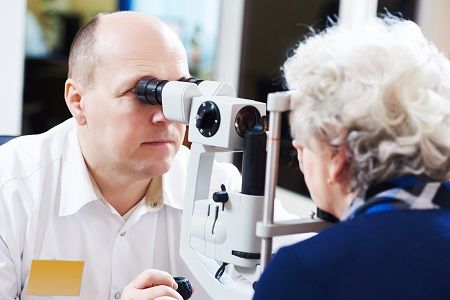Article
Good Vision in One Eye Could Help Prevent Sleep Problems in AMD
Author(s):
Researchers set out to see how prevalent sleep problems are in people with age-related macular degeneration (AMD) at the 34th Annual Scientific Meeting of the American Society of Retina Specialists (ASRS 2016) in San Francisco, California.

Previous research has shown that people with mild to moderate visual impairment are more likely to have poor sleep quality. Therefore, Lauren Nicosia, MD, and colleagues from the Department of Ophthalmology at the Northwestern University Feinberg School of Medicine set out to identify sleep quality in those with age-related macular degeneration (AMD).
Using 68 patients with AMD (45 with exudative AMD (E-AMD) and 23 with non-exudative AMD (NE-AMD), the team followed sleep patterns from November 2015 to February 2016. The participants did not have any other retinal diseases. The results were presented in a poster presentation at the 34th Annual Scientific Meeting of the American Society of Retina Specialists (ASRS 2016) in San Francisco, California.
The patients (all over the age of 55) completed the PROMIS Sleep Disturbance Questionnaire 8a, Berlin Questionnaire, and Insomnia Severity Survey. These surveys give insight to subjective sleep quality as well as screen for obstructive sleep apnea.
- MD Magazine is on Facebook, Twitter, Instagram, and LinkedIn!
Visual acuity averaged at 0.146 logMAR (20/27 Snellen) in the better seeing eye and 0.478 logMAR (20/60 Snellen) in the worse seeing eye. A total of 62 patients had vision 20/40 or better and the remaining six patients had vision 20/100 in the better eye.
T scores from the PROMIS questionnaire showed that people with AMD had significantly less sleep disturbance when compared to the general population (42.47 vs. 50). Thirteen patients (18%) had known that they had obstructive sleep apnea before the study, but the Berlin Questionnaire revealed that 22 patients (32%) had the condition. The Insomnia Severity Survey showed that 54 patients did not have clinical indication of insomnia, but 11 patients had subthreshold, and three had moderate scores.
“Patients with AMD and good vision (greater than 20/40) in at least one eye do not subjectively report sleep disturbances as measured by the PROMIS questionnaire in this study,” the authors confirmed. “Maintaining good vision in one eye may prevent patients with AMD from experiencing sleep disturbances.”
Also on MD Magazine >>> More News from ASRS 2016 in San Francisco




